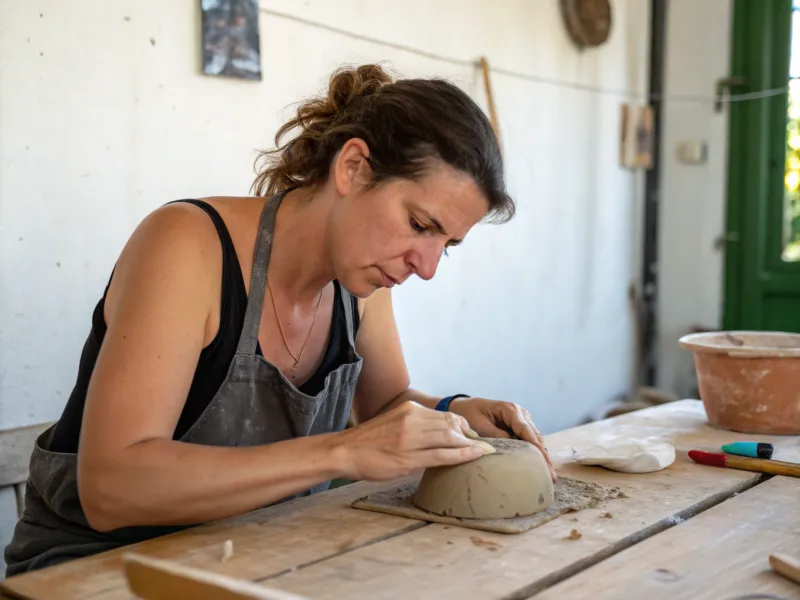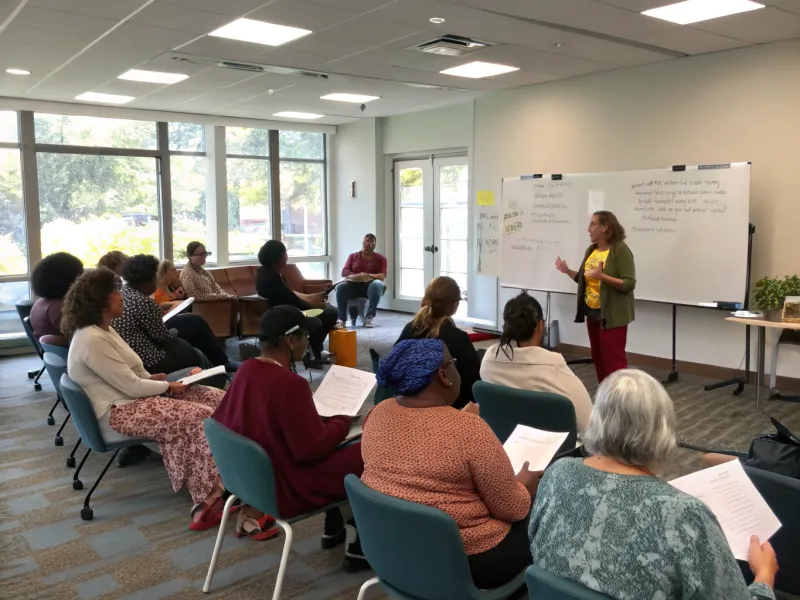32 Coping Skills That Can Help You Survive A Bad Marriage You Can’t Yet Leave
Being trapped in a marriage that feels more like a prison than a partnership can be one of the most isolating experiences.
Trust that your feelings are valid and that you are not alone. There is hope, even if the path forward seems shrouded in darkness.
Here are 32 coping skills to help you reclaim a sense of control and nurture your well-being, even amidst chaos.
1. Emotional Detachment

Sometimes, the heart yearns for peace that the mind knows isn’t possible. Emotional detachment doesn’t mean you’re giving up; rather, it’s about finding a sanctuary within yourself. Picture your emotions as waves in a turbulent sea; you are the lighthouse, steadfast and bright.
In a difficult marriage, detachment can be a lifesaver. It allows you to weather storms without letting them define your existence. You might start by recognizing your triggers and consciously choosing to respond rather than react.
This skill takes practice, but over time, it offers incredible strength. It’s akin to building a fortress around your heart, where only you control the drawbridge. Let this practice become your refuge, offering peace when the outside world seems intent on chaos.
2. Self-Care Rituals

In the midst of turmoil, nurturing yourself can feel like an act of rebellion. Self-care is more than bubble baths and candles; it’s about reclaiming your right to joy and peace. It’s about giving yourself permission to put your needs first, even when the world tells you otherwise.
Create daily rituals that remind you of your worth. Maybe it’s a quiet cup of tea as the sun rises, or a walk in the park where the birds sing just for you. These moments are not just indulgences; they are necessities.
Craft these rituals with intention, making them non-negotiable parts of your day. Each act of self-care is a step toward reclaiming your power and reminding yourself that you are deserving of love, especially from yourself.
3. Boundary Setting

In a marriage where respect feels like a distant memory, boundaries become your best ally. It’s not about building walls but creating spaces where you feel safe and respected. Imagine these boundaries as invisible lines that protect your peace.
Setting boundaries requires clear communication. Let your partner know what behaviors are unacceptable. This isn’t about confrontation but about preservation.
With each boundary set, you reclaim a piece of yourself. It’s a declaration of your worth and a reminder that you have the right to exist freely and without fear. Boundaries are your shield, guarding your heart against the storms of disrespect.
4. Finding Support Systems

Isolation can magnify the challenges of a troubled marriage. Finding a support system can be a lifeline, offering solace on the darkest days. Reach out to friends or family who understand, or seek support groups where shared experiences become a source of strength.
These connections remind you that you are not alone in your struggle. In these circles, you will find people who listen without judgment, who offer empathy when you need it most.
Lean on these networks to share your burdens and celebrate your victories. They are your tribe, your sanctuary, providing the kind of understanding that can only come from shared experiences. In their company, you’ll find the strength to face another day.
5. Practicing Mindfulness

When your mind is a battleground, mindfulness offers a path to peace. Practicing mindfulness is about anchoring yourself in the present, letting go of past regrets and future anxieties. It’s a gentle yet powerful practice that centers you amid life’s chaos.
Begin with small moments of awareness. Notice the warmth of the sun on your skin, or the rhythm of your breath. These moments ground you, bringing clarity where there was once confusion.
Mindfulness isn’t a destination but a journey. With each mindful breath, you carve out a space of peace within yourself. This practice becomes a haven, helping you navigate the turbulence of your marriage with grace and resilience.
6. Focusing on Personal Goals

In the confines of a difficult marriage, shifting focus to personal goals can be transformative. It’s about redirecting energy from the turmoil towards something that fuels your sense of purpose and identity. This shift can invigorate your spirit and remind you of who you are beyond your marital status.
Start by identifying what truly matters to you. Maybe it’s pursuing a hobby, advancing your career, or embarking on a fitness journey. These goals become beacons, guiding you through the fog.
Each small achievement in this personal quest is a victory. It’s a testament to your resilience and capability. In pursuing these goals, you reestablish control over your life, crafting a narrative where you are the protagonist, not just a passenger.
7. Journaling Your Thoughts

Journaling can be a powerful outlet for emotions trapped by the confines of a challenging marriage. It’s where thoughts find a voice and feelings are acknowledged. The page becomes a friend who listens without judgment, a space where you can be truly honest.
Writing daily helps you track your emotional landscape. Over time, patterns emerge, providing insight into triggers and responses. This awareness is empowering, a tool for navigating interactions.
Your journal is a sanctuary, a place where your thoughts are safe. In weaving your stories, you reclaim your narrative. It’s an act of self-compassion, reminding you that your experiences and feelings matter.
8. Adopt a Pet

Adopting a pet can bring unconditional love and companionship into your life. Pets have a unique way of reducing stress and increasing happiness with their loyal and playful nature.
The responsibility of caring for an animal can also add structure to your day, giving you a sense of purpose. Pets often become cherished family members who offer comfort and understanding without judgment.
Whether you choose a dog, cat, or other animal, the bond you form can be deeply therapeutic. This companionship can provide solace and a sense of connection during challenging times.
9. Engaging in Physical Activity

Physical activity can be a profound healer in the midst of marital strife. It’s not just about physical health but the mental clarity and emotional release it provides. Whether it’s a brisk walk, a yoga session, or a workout at the gym, moving your body offers a powerful antidote to stress.
Exercise releases endorphins, the body’s natural mood lifters. It’s a way to channel pent-up emotions into something constructive and uplifting.
Make this time sacred, a non-negotiable appointment with yourself. As you move, let each step, stretch, or breath be a testament to your strength and resilience. In these moments, you find freedom and empowerment.
10. Connecting with Nature

Nature has an unparalleled ability to heal and inspire, offering a sanctuary away from the chaos of an unhappy marriage. The rustling of leaves, the whisper of the wind, and the serene beauty of a sunset can provide comfort and perspective.
Spending time outdoors can be grounding. It reminds you of the vastness of the world and your place within it. This connection fosters a sense of peace and belonging.
Regular walks in nature or simply sitting quietly in a park can rejuvenate your spirit. In these moments, you find a quiet strength, a reminder that life is full of beauty and possibilities, even when shadows loom large.
11. Developing a Hobby

In a marriage lacking fulfillment, developing a hobby can reignite the spark within you. It’s a way to explore interests that are purely yours, offering an escape and a sense of achievement.
Whether it’s painting, gardening, or learning an instrument, a hobby can become a refuge. It’s about creating something beautiful in a world that feels chaotic.
Hobbies offer more than distraction; they’re a means of self-expression and growth. They remind you of your capabilities and passions, helping you reconnect with your true self beyond the role of a spouse. This exploration becomes a testament to your resilience and creativity.
12. Seeking Professional Help

When the challenges of marriage feel insurmountable, seeking professional help can be a lifeline. A therapist provides an objective perspective, helping you navigate complex emotions and develop healthy coping strategies.
Therapy is a safe space to explore your feelings. It’s a collaborative journey towards understanding and healing.
Engaging with a professional can offer clarity and validation, reaffirming that your feelings are legitimate. It becomes a partnership, where you work together to find pathways to peace and resilience. It’s an empowering step, showcasing your commitment to your own well-being.
13. Exploring Spiritual Practices

Spiritual practices can offer solace and meaning amid the turmoil of a difficult marriage. Whether it’s meditation, prayer, or attending a faith-based community, these practices provide a framework for understanding and navigating life’s challenges.
Spirituality isn’t about adhering to strict doctrines but finding what resonates with your soul. It’s about connecting to something greater than yourself, offering perspective and peace.
Engaging in these practices nurtures your inner world, strengthening your spirit. It’s a journey of exploration, where you find comfort and guidance, helping you face each day with renewed hope and grace.
14. Creating a Safe Space at Home

In the midst of marital discord, creating a safe space at home becomes essential. It’s about carving out a sanctuary where you can retreat, reflect, and rejuvenate.
This space doesn’t need to be large or extravagant. A corner with a comfy chair, a few cherished books, and soft lighting can become your haven.
Personalize it with items that bring you joy and peace. This space becomes a physical manifestation of your inner sanctuary, a place where you can escape the chaos, even if just for a moment. It’s your sacred ground, where you nurture and protect your well-being.
15. Limiting Negative Interactions

In a marriage fraught with tension, limiting negative interactions is a crucial coping mechanism. It’s not about avoidance but about protecting your emotional well-being.
Identify situations that typically lead to conflict and find ways to minimize your exposure. It might mean setting specific times for difficult discussions or choosing to walk away when conversations escalate.
By controlling these interactions, you reduce stress and maintain your peace of mind. It’s a proactive step towards safeguarding your emotional health, reminding you that you are in control of how you engage with negativity.
16. Practicing Forgiveness

Forgiveness is a powerful tool in navigating the complexities of an unhappy marriage. It’s not about excusing hurtful behavior but freeing yourself from the weight of resentment.
Forgiving doesn’t mean you forget or condone what’s happened. It’s about releasing the hold that anger and bitterness have on your heart.
This process is deeply personal and can take time. As you forgive, you reclaim emotional energy, redirecting it toward healing and peace. It’s a gift you give yourself, offering freedom from the chains of past grievances.
17. Building Routine and Structure

In the unpredictability of a troubled marriage, establishing routine and structure can provide stability. Routines offer a sense of predictability and control, grounding you amidst the chaos.
Start by setting daily or weekly rituals that bring comfort. It might be a morning walk, scheduled meal times, or a bedtime reading session.
These routines become anchors, providing a sense of normalcy and purpose. They’re reminders that you can create order and stability in your life, despite external instability. It’s a self-empowering act, reinforcing your ability to shape your environment.
18. Engaging in Creative Expression

Creative expression can be a profound outlet for emotions in an unfulfilling marriage. It allows you to channel your feelings into something tangible and beautiful.
Whether it’s painting, writing, music, or dance, find a medium that resonates with you. Let it become your voice when words fail.
In expressing creativity, you explore and release emotions, finding catharsis. It’s a journey inward, where you connect with yourself and your experiences, transforming pain into art. This practice becomes a powerful tool for healing and self-discovery.
19. Reading Inspirational Literature

Inspirational literature can be a beacon of hope in the storm of an unhappy marriage. Books offer wisdom, comfort, and new perspectives, becoming companions on your journey to healing.
Seek out works that speak to resilience, courage, and personal growth. These stories remind you of the possibilities that exist beyond your current struggles.
Reading becomes a refuge, a place where you find solace and strength. It’s an act of self-care, offering a mental escape and a source of inspiration. In the words of others, you find guidance and a reminder that you are not alone.
20. Cultivating Empathy

Cultivating empathy can transform interactions within an unhappy marriage. It’s about understanding your partner’s perspective, even amidst conflict.
Empathy doesn’t mean agreeing with everything but recognizing the feelings and experiences of the other. It opens pathways to communication and healing.
Practicing empathy fosters connection and compassion, even in challenging times. It helps bridge divides, creating a more understanding and supportive relationship, which can be a foundation for change and growth.
21. Create a Vision Board

Crafting a vision board can become a sanctuary of hope and creativity. It allows you to visualize your dreams, turning abstract thoughts into tangible goals. By focusing on future aspirations, you channel positive energy, offering a mental escape from current struggles. Involve yourself in the process by collecting images and quotes that resonate with you. Layer them in a way that tells a story of your desired journey.
This exercise is more than just crafting; it’s a therapeutic way to reconnect with your innermost desires. The board becomes a daily reminder of what you aim to achieve, subtly guiding you towards those ambitions each day. As your board evolves, so does your mindset, nurturing resilience and motivation.
22. Setting Realistic Expectations

In the landscape of an unhappy marriage, setting realistic expectations can provide clarity and reduce disappointment. It’s about understanding what you can control and what lies beyond your influence.
Reflect on your expectations, assessing their feasibility. Adjusting them isn’t about settling but aligning with reality to minimize frustration.
By setting realistic expectations, you cultivate patience and acceptance. It’s an act of self-kindness, acknowledging that while not everything is within your control, you can still find peace and contentment in the present.
23. Practicing Deep Breathing

Deep breathing is a simple yet powerful tool for managing stress in a strained marriage. It’s about harnessing the breath to calm the mind and body.
Practice deep breathing by inhaling slowly through your nose, holding for a moment, and exhaling through your mouth. This process engages the body’s relaxation response.
In moments of tension, deep breathing offers a quick reset, grounding you in the present. It’s an accessible practice, providing immediate relief and helping you maintain composure amidst conflict.
24. Attend Workshops or Seminars

Participating in workshops and seminars can open doors to new interests and communities. These events often provide fresh perspectives and ideas, which can be invigorating and enlightening.
Workshops are a great way to meet like-minded individuals and learn from experts in various fields. Whether it’s creative writing, photography, or personal development, there’s something enriching about shared learning experiences.
They offer not only knowledge but also the chance to step outside your usual environment and routine.
25. Joining a Support Group

Support groups offer a community of understanding for those navigating difficult marriages. It’s a space where shared experiences create bonds and offer strength.
Joining a group provides validation and empathy, reminding you that you are not alone in your struggles.
In these circles, you find encouragement and advice, learning from others’ journeys. It’s a supportive environment, where you can share your story and draw strength from collective resilience.
26. Engaging in Volunteer Work

Volunteer work offers a sense of purpose and fulfillment, redirecting focus from personal struggles to helping others. It’s about giving back, finding joy in service.
Engaging in community work can provide perspective, reminding you of your strengths and capacities.
This involvement offers a break from marital stresses, channeling energy into positive action. It’s a reminder that you can make a difference, finding meaning and joy in the service of others.
27. Practicing Self-Compassion

Self-compassion is about treating yourself with kindness and understanding, particularly in the face of marital stress. It’s a gentle reminder that you deserve love and care.
Acknowledge your feelings without judgment. This practice fosters resilience and self-acceptance.
Embrace your imperfections and vulnerabilities, offering yourself the same compassion you would extend to a friend. In this self-kindness, you reclaim your worth and foster emotional well-being.
28. Taking Regular Breaks

Regular breaks provide much-needed respite from the strains of an unhappy marriage. It’s about stepping back to recharge and gain perspective.
Even short breaks can offer relief and clarity. Use this time to engage in activities that rejuvenate your spirit.
These moments are essential, reminding you of the importance of rest and self-care. In taking breaks, you affirm your right to peace and renewal, building strength for the journey ahead.
29. Take a Solo Adventure

Embarking on a solo adventure can be a thrilling way to find clarity and peace. Whether it’s a day trip to a nearby town or a weekend getaway, traveling alone can help you reconnect with yourself.
This time away allows for reflection and self-discovery, free from the pressures of your marital situation. It also boosts confidence as you navigate new experiences independently.
A solo adventure is about embracing freedom and exploring new horizons. It’s a reminder that life is full of possibilities, and you are capable of shaping your own path.
30. Create a Personal Sanctuary

In the midst of a turbulent marriage, establishing a personal sanctuary at home can make a world of difference. Select a spot that’s solely yours—a corner in a room or even a whole room. Fill it with items that bring you peace and comfort, such as books, cushions, or art.
This sanctuary acts as a retreat where you can unwind and recharge. It doesn’t have to be grand or expensive; simplicity is key. The aim is to have a dedicated space where you can escape the noise and stress of your daily life.
By retreating to your sanctuary regularly, you give yourself permission to relax and reflect. It can serve as a reminder of your individuality and provide the emotional space needed to cope with marital challenges.
31. Practicing Gratitude Daily

In the thick of an unhappy marriage, gratitude might feel like a distant concept—but it can quietly transform your perspective. It’s not about ignoring your pain or pretending everything’s fine; it’s about noticing the small, good things that still exist within your day.
Start simple: a warm cup of coffee, a kind word from a friend, the way the sunlight filters through your window. These tiny moments, when acknowledged, create subtle shifts in mindset that help anchor you in hope.
Keeping a gratitude journal or whispering a thank-you to the universe before bed can feel like a lifeline. It doesn’t fix the marriage, but it strengthens your spirit, reminding you that beauty still exists—and that you still deserve to feel it.
32. Learning Something New

In a situation that feels stagnant, learning something new can be a lifeline to a version of yourself that still dreams, still grows, still believes in the future. Whether it’s taking an online class, learning a language, or trying a craft you’ve always admired, feeding your mind offers both escape and empowerment.
This isn’t about productivity for the sake of it—it’s about rediscovering your capacity to evolve. Gaining new knowledge reminds you that you are more than your relationship status. You are capable, intelligent, and worthy of growth.
Let your curiosity lead you. Each new thing you learn is a quiet act of rebellion against hopelessness—and a powerful step back toward yourself.







